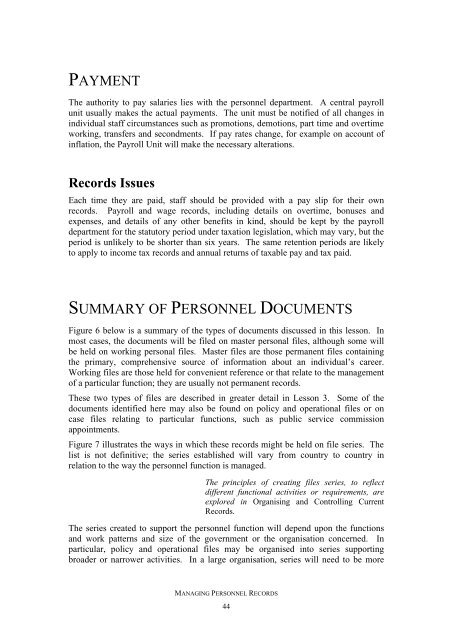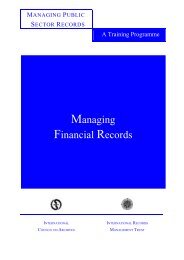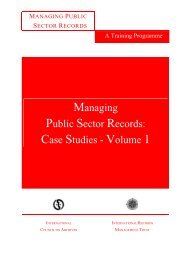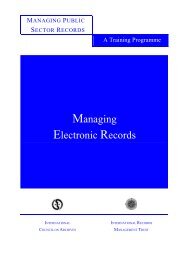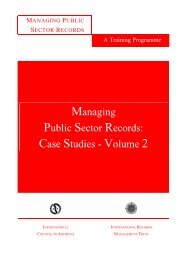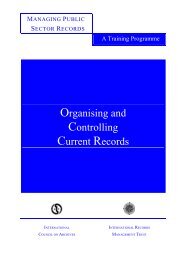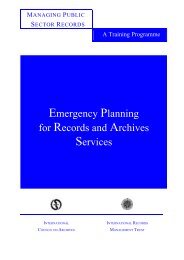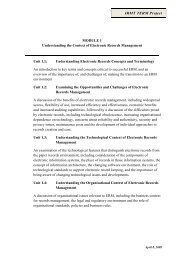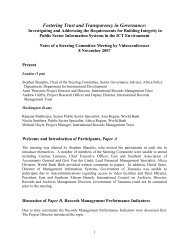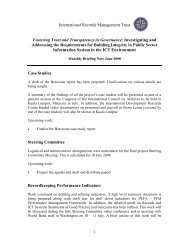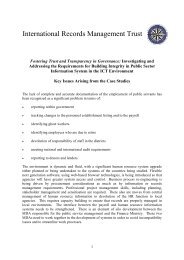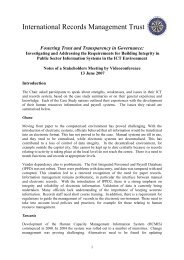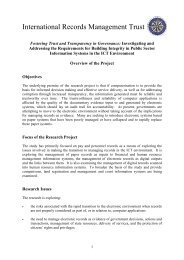Managing Personnel Records - International Records Management ...
Managing Personnel Records - International Records Management ...
Managing Personnel Records - International Records Management ...
You also want an ePaper? Increase the reach of your titles
YUMPU automatically turns print PDFs into web optimized ePapers that Google loves.
PAYMENT<br />
The authority to pay salaries lies with the personnel department. A central payroll<br />
unit usually makes the actual payments. The unit must be notified of all changes in<br />
individual staff circumstances such as promotions, demotions, part time and overtime<br />
working, transfers and secondments. If pay rates change, for example on account of<br />
inflation, the Payroll Unit will make the necessary alterations.<br />
<strong>Records</strong> Issues<br />
Each time they are paid, staff should be provided with a pay slip for their own<br />
records. Payroll and wage records, including details on overtime, bonuses and<br />
expenses, and details of any other benefits in kind, should be kept by the payroll<br />
department for the statutory period under taxation legislation, which may vary, but the<br />
period is unlikely to be shorter than six years. The same retention periods are likely<br />
to apply to income tax records and annual returns of taxable pay and tax paid.<br />
SUMMARY OF PERSONNEL DOCUMENTS<br />
Figure 6 below is a summary of the types of documents discussed in this lesson. In<br />
most cases, the documents will be filed on master personal files, although some will<br />
be held on working personal files. Master files are those permanent files containing<br />
the primary, comprehensive source of information about an individual’s career.<br />
Working files are those held for convenient reference or that relate to the management<br />
of a particular function; they are usually not permanent records.<br />
These two types of files are described in greater detail in Lesson 3. Some of the<br />
documents identified here may also be found on policy and operational files or on<br />
case files relating to particular functions, such as public service commission<br />
appointments.<br />
Figure 7 illustrates the ways in which these records might be held on file series. The<br />
list is not definitive; the series established will vary from country to country in<br />
relation to the way the personnel function is managed.<br />
The principles of creating files series, to reflect<br />
different functional activities or requirements, are<br />
explored in Organising and Controlling Current<br />
<strong>Records</strong>.<br />
The series created to support the personnel function will depend upon the functions<br />
and work patterns and size of the government or the organisation concerned. In<br />
particular, policy and operational files may be organised into series supporting<br />
broader or narrower activities. In a large organisation, series will need to be more<br />
MANAGING PERSONNEL RECORDS<br />
44


